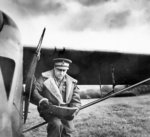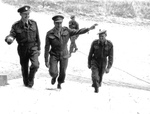Henry Crerar
| Surname | Crerar |
| Given Name | Henry |
| Born | 28 Apr 1888 |
| Died | 1 Apr 1965 |
| Country | Canada |
| Category | Military-Ground |
| Gender | Male |
Contributor: C. Peter Chen
ww2dbaseHenry Duncan Graham Crerar was born in Hamilton, Ontario, Canada. Upon completing his schooling at the Upper Canada College, he entered the Royal Military College of Canada in Kingston, Ontario, graduating in 1909. Between 1910 and 1912, he was a research engineer with the Hydro Electric Power Commission of Ontario. During WW1, he fought in France as a field artillery officer, earning the Distinguished Service Order and the rank of lieutenant colonel. During the inter-war years, he remained in the Canadian Army. In 1923, he attended the Camberley Staff College in England, United Kingdom, then remained in England to serve with the War Office in London. In 1929, he returned to Canada and served with the National Defence Headquarters, charged with the reorganization of the Canadian Militia. In 1934, he attended the Imperial Defence College in London, then served as the Director of Military Operations and Intelligence. In Mar 1939, he was recalled to Ottawa as political tensions mounted in Europe.
ww2dbaseWhen the European War began, Crerar was in London as Brigadier General Staff at the Canadian Military Headquarters, responsible for preparing barracks and supplies in England for Canadian troops due to arrive in the near future. In Jul 1940, he returned to Ottawa as Vice Chief General Staff, and then was promoted to Chief General Staff only a few days later; in this role, he bolstered Canada's ability to recruit and train new troops. On 23 Dec 1941, in England, he was named the commanding officer of the Canadian I Corps. On 19 Aug 1942, the failure at Dieppe fell directly under his jurisdiction, as Canadian troops who participated in that assault were under his operational command. In Mar 1944, he returned to England to prepare for his new role as the commanding officer of the Canadian 1st Army.
ww2dbaseAt the helm of the 1st Army, Crerar played a major role in the Normandy campaign, particularly with the success in enclosing German troops in the Falaise Gap. In late 1944, he stepped aside to recover from illness, thus missing the action at the Scheldt Estuary. In Nov 1944, he was promoted to the rank of general. In Feb 1945, he returned to command with the 1st Army, and led the broad-front attack toward the Rhine River.
ww2dbaseCrerar retired from Army service in 1946, and later became a diplomat to Czechoslovakia, the Netherlands, and Japan. On 25 Jun 1964, he became a member of the Queen's Privy Council for Canada. Crerar passed away in Ottawa, Ontario, Canada.
ww2dbaseSources: Juno Beach Centre, Wikipedia.
Last Major Revision: Feb 2008
Henry Crerar Interactive Map
Photographs
 |  |
Henry Crerar Timeline
| 28 Apr 1888 | Henry Crerar was born. |
| 21 Aug 1944 | Lieutenant General Henry D. G. Crerar, commander of the 1st Canadian Army, sacked Major-General George Kitching, commander of the 4th Canadian Armoured Division, as a recrimination for the accusation that II Canadian Corps had moved too slowly to close the Falaise Gap in France, thereby allowing some 20,000 to 50,000 enemy troops to escape encirclement. |
| 1 Apr 1965 | Henry Crerar passed away. |
Please consider supporting us on Patreon. Even $1 per month will go a long way! Thank you. Please help us spread the word: Stay updated with WW2DB: |
Visitor Submitted Comments
7 Jun 2016 06:41:49 AM
lol learn how to spell
All visitor submitted comments are opinions of those making the submissions and do not reflect views of WW2DB.

» Attack on Dieppe
» Normandy Campaign, Phase 1
» Advance to the Rhine
- » 1,182 biographies
- » 337 events
- » 45,119 timeline entries
- » 1,249 ships
- » 350 aircraft models
- » 207 vehicle models
- » 376 weapon models
- » 123 historical documents
- » 261 facilities
- » 470 book reviews
- » 28,415 photos
- » 365 maps
George Patton, 31 May 1944
22 Oct 2009 06:45:28 PM
i like it
its worth the reading